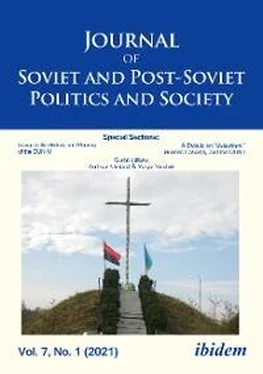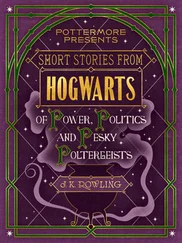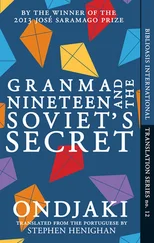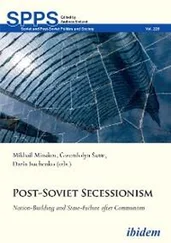Oksana Myshlovska’s paper “History Education and Reconciliation: The Ukrainian National Underground Movement in Secondary School Curricula, Textbooks, and Classroom Practices (1991–2012)” deals with the representation of controversial issues related to the OUN and UPA in secondary school curricula and textbooks, and teachers’ responses to these, during the first two decades of Ukraine’s independence. Guided by theoretical insights into the role of representations of the past in conflict transformation and reconciliation, she explores the depiction of the conflict between the nationalist organizations and Soviet regime, and discusses the role of history teachers as mediators of the changing official curricula and textbooks. Myshlovska thereby contributes to the emerging subfield of history education studies regarding Ukraine’s nationalist underground movement. 20
On the basis of an analysis of history textbooks and curricula, she concludes that textbooks often offer “mono-perspectival” and politicized narratives when discussing controversial issues and conflicts. From this, Myshlovska concludes that these representations often structurally circumscribe the possibilities for conflict transformation and reconciliation. Nevertheless, focus group discussions conducted with schoolteachers in different regions of Ukraine in 2011 and 2012 revealed that teachers do sometimes take on a conflict mitigating role, by way of presenting various perspectives on disputed issues and inviting discussions, within the classroom, of wrongdoing by all conflicting parties in past conflicts.
The section ends with Marian Luschnat-Ziegler’s paper “Observing Trends in Ukrainian Memory Politics (2014–2019) through Structural Topic Modeling” where he analyzes online-publications produced by the Ukrainian Institute of National Memory (Ukr. abbr.: UINP) during Petro Poroshenko’s presidency, and Volodymyr V’iatrovych’s directorship of the UINP. Applying a sophisticated mathematical model to his data, Luschnat-Ziegler identifies key topics, trends, and connections in the narratives produced by the UINP. The author finds that web publications concerning the OUN and UPA comprised an altogether relatively low proportion of the output of the UINP in comparison to publications about other topics. 21Most of the UINP’s publications concerned the 2013–2014 Revolution of Dignity. The next three ranks in Luschnat-Ziegler’s table of topics were occupied by the Ukrainian revolution of 1917–21, the Holodomor of 1932–33, and the Second World War of 1939–45. The OUN-UPA was ranked fifth in the topics highlighted in UINP online publications of 2014–2019.
These results may be in need of further interpretation as they point towards a variety of potential determinants of the UNIP’s publications policies. One hypothesis emerging from Luschnat-Ziegler’s study could be that, as hagiographic interpretations of the OUN-UPA were becoming increasingly mainstream in Ukraine’s mass media since 2014, the perceived need for propagating them further via publications in the governmental UINP declined. As a result, the topic moved from a potentially high position on the UINP’s agenda under its then director V’iatrovych to only fifth place, among the topics identified by Luschnat-Ziegler.
The author also highlights the role of anniversaries in the formation of certain trends in memory discourse—an observation made by other researchers of national remembrance. 22Thus, the proportion of publications about the revolution of 1917–21 has grown since 2017. The topic of the Holodomor peaked yearly in November around the national Day of Repressions and Holodomor. Luschnat-Ziegler demonstrates how probabilistic topic modelling can be a valuable tool for researchers in the field of memory studies, enabling new insights to be derived from the rich quantitative material now available and intriguing hypotheses to be interpreted in view of the wider political and societal situation in which this or that historical topic rises and falls.
The articles in this and our three previous special sections highlight not only certain differences between the history and memory of the OUN and UPA. 23They also indicate changes in the ways these organizations have been remembered by Ukrainian society since independence in 1991. In spite of otherwise significant transformations, the topic of the OUN and UPA has, over the last thirty years, remained a uniformly contentious issue triggering not only heated scholarly discussions, but also larger public debates. Moreover, against the background of the Russian-Ukrainian war since 2014, a process of “securitization” of national memory underway in Ukraine, whereby historical discourses become matters of national security, and within which the topic of the OUN and UPA occupies a central position. 24
1* We are very grateful to Julie Fedor for her extremely careful and patient final editing of the contributions to this special section including this introduction. Per Anders Rudling, Łukasz Adamski, Yuriy Radchenko, and Gelinada Grinchenko too are acknowledged for their valuable help in preparing this section.
The fifth installment of this series is currently scheduled to be published by JSPPS, in autumn 2021. Proposals for further sections “Issues in the History and Memory of the OUN” are welcome. These should take the form of a set of abstracts and notes on contributors, and can be emailed to the journal’s General Editor (details at www.jspps.eu).
2Per Anders Rudling, “Yushchenko’s Fascist: The Bandera Cult in Ukraine and Canada,” Yaroslav Hrytsak, “Ukrainian Memory Culture Post-1991: The Case of Stepan Bandera,” Yuliya Yurchuk, “Rivne’s Memory of Taras Bul’ba-Borovets’: A Regional Perspective on the Formation of the Founding Myth of the UPA,” and Łukasz Adamski, “Kyiv’s ‘Volhynian Negationism’: Reflections on the 2016 Polish–Ukrainian Memory Conflict,” Journal of Soviet and Post-Soviet Politics and Society 3, no. 2 (2017): 129–290; Ivan Gomza, “Catalytic Mobilization of Radical Ukrainian Nationalists in the Second Polish Republic: The Impact of Political Opportunity Structure,” Igor Barinov, “Allies or Collaborators? The Organization of Ukrainian Nationalists and Nazi Germany during the Occupation of Ukraine in 1941–43,” Myroslav Shkandrij, “Volodymyr Viatrovych’s Second Polish–Ukrainian War, ” and John-Paul Himka, “Correspondence,” Journal of Soviet and Post-Soviet Politics and Society 4, no. 2 (2018): 35–132.
3Kai Struve, “The OUN(b), the Germans, and Anti-Jewish Violence in Eastern Galicia during Summer 1941,” Yuri Radchenko, “The Biography of the OUN(m) Activist Oleksa Babii in the Light of His ‘Memoirs on Escaping Execution’ (1942),” Tomislav Dulić and Goran Miljan, “The Ustašas and Fascism: ‘Abolitionism,’ Revolution, and Ideology (1929–42),” Journal of Soviet and Post-Soviet Politics and Society 6, no. 1 (2020): 205–306.
4 Journal of Soviet and Post-Soviet Politics and Society 7, nos. 1 & 2 (2021).
5Oleksandr Zaitsev, “Fascism or Ustashism? Ukrainian Integral Nationalism of the 1920s–1930s in Comparative Perspective,” Communist and Post-Communist Studies 48, nos. 2–3 (2015): 183–93. See also, more recently: idem , “Integral Nationalism in the Absence of a Nation-State: The Case of Ukraine,” in Marco Bresciani (ed.), Conservatives and Right Radicals in Interwar Europe (Routledge, 202o), 118–42.
6Dulić and Miljan, “The Ustašas and Fascism.”
7Andreas Umland and Yuliya Yurchuk, “The Organization of Ukrainian Nationalists (OUN) in Post-Soviet Ukrainian Memory Politics, Public Debates, and Foreign Affairs,” Journal of Soviet and Post-Soviet Politics and Society 3, no. 2 (2017): 115–28, spps-jspps.autorenbetreuung.de/files/umland_yurchuk_3_2.pdf (accessed 16 April 2018); idem , “Essays in the Historical Interpretation of the Organization of Ukrainian Nationalist,” Journal of Soviet and Post-Soviet Politics and Society 4, no. 2 (2018): 29–34, spps-jspps.autorenbetreuung.de/files/yurchuk_umland_jspps_4.2_2.pdf (accessed 26 January 2020); and idem , “The Organization of Ukrainian Nationalists and European Fascism During World War II,” Journal of Soviet and Post-Soviet Politics and Society 6, no. 1 (2020): 181–204, spps-jspps.autorenbetreuung.de/files/06-01-jspps-intro_02.pdf (accessed 26 January 2020).
Читать дальше












